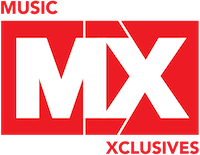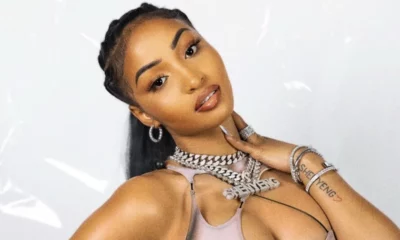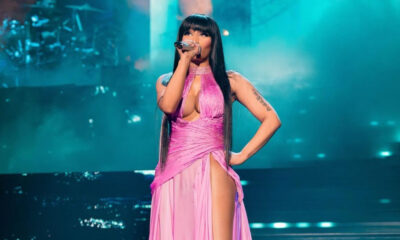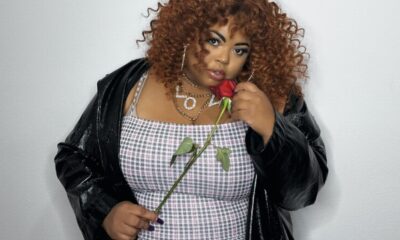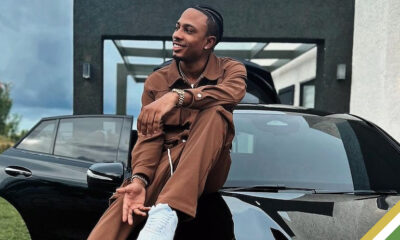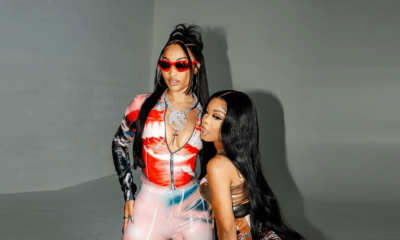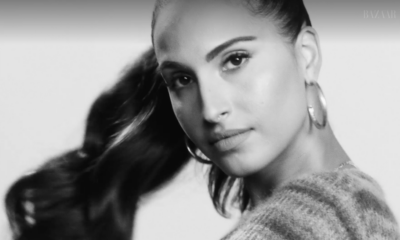Features
Feature: Pisceze On Genre Blending, Asian Culture, Gaming and Giving Back
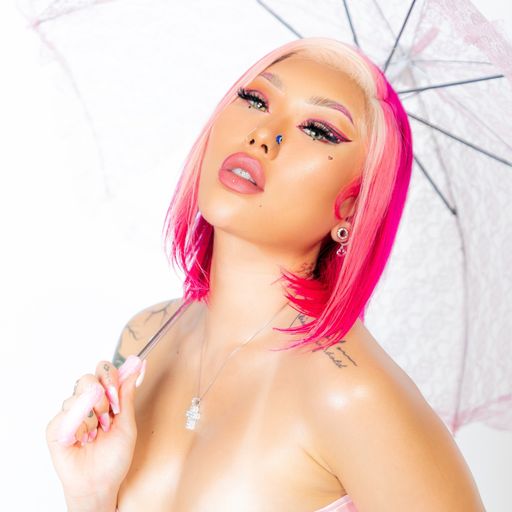

Pisceze can do it all. The genre-blending artist has taken Canada by storm, releasing bops like “Dodging Bullets,” “Red Handed” and “Five” to great reception. With a unique Korean-Japanese background juxtaposed with her Canadian upbringing, one would be remiss to try to fit Pisceze into a box. Rather, the multi-hyphenate infuses elements of R&B and K-pop in her music with vocals that captivate a wide variety of listeners. Her latest single, “Crush (Sped Up)” featuring 12AM was released just in time for Halloween weekend (Oct. 28).
Her efforts have been paying off. Pisceze was listed in Complex Canada’s “Top 6 Canadian Artists You’ve Been Sleeping On.” She is part of RBC’s notable “19 Rising Canadian Music Artists” to join First Up with RBCxMusic. Earlier this year, she made Triller’s renowned Artist Spotlight.
In addition to creating genre-defying sonic cocktails, Pisceze has written for some of the biggest artists in the game, is a makeup and beauty entrepreneur, and consistently streams gaming content on Twitch. Besides her immeasurable talent, the artist has overcome insurmountable odds including a tough educational upbringing and homelessness to give back to her community through fundraisers and clothing drive efforts.
Terzel Ron spoke to the multi-hyphenate to pick her brain about her music, emotions, upbringing and education, captivating visuals and future goals as she takes the music world (amongst others) by storm.

First things first. I love your name! Are you actually a Pisces?
No, I’m a Scorpio. Haha yes, I’m a Pisces!
What part of being a pisces do you most identify with to choose it as your name?
Emotional. Very emotional. I mean, a lot of people, I feel like, kind of take being emotional as a bad thing, as a bad thing or something that’s weak, but I feel like that’s there it’s a very powerful thing when you know how to embrace and be in in tune with your emotions, especially, like, creating in this time.
A lot of people in this generation are in that, like, I don’t care vibe. For me, I’m always choosing my emotions. If something makes me sad, I’m going to always embrace that I’m sad. And if something is making me happy, I’m always going to embrace that I’m happy.
I feel like a lot of people should know how to be in tune with their emotions.
Absolutely. Yeah. Even in this generation, people don’t really know how to express their emotions. Right. And I used to be that person where I didn’t know. Coming from an Asian household, we’re not really allowed to express our emotions because it kind of gets shut down.
Interesting. By your parents or by your community?
The Asian culture, you know, with my family growing up, was very strict. I’d come home with, like, a B plus, and I’d be like, ‘why wasn’t it an A?’ Like, it was never good enough. But I mean, I don’t regret it just because it molded into the person that I am right now. I’ve learned to express my emotions through my music, and that was probably, like, the easiest for me to express it. And then, you know, I’m kind of molded into, like, expressing how I feel in my day to day life.
So, say for example you had a tough day and your parent’s wouldn’t necessarily understand. Would you go to the studio and make a song or go to your room and experiment with itunes and make your own music?
Yeah, basically, even if it’s not from my parents, like anything, like friendship, relationship, any emotion that I feel, I feel like it comes from my creativity. It comes from my emotions.
You mentioned that you’re both Korean and Japanese. Has there been a sort of clash of those two separate cultures that you’ve had to overcome while growing up? For example, have you ever felt like you needed to be more one thing and less of the other thing?
Of course. My mom is Korean, my dad is Japanese, and both cultures are very traditional in different ways. So, yeah, growing up I was a little bit confused because my mom’s side would tell me one thing, like what tradition and culture is to her. And then my dad’s side would be like, no, this is culture, and stuff like that. And even like learning the language growing up, it’s like, ‘this has to be your first language.’ Oh, no, ‘this has to be your first language.’
Oh wow. Are you fluent in both?
Yes, both. So actually my first language is Japanese and then my mom kind of took over and was like, no, you need to learn how to speak Korean only. So I’m very fluent in Korean because my mom decided to just talk and communicate with me in Korean only in the house. Music wise, I haven’t really tapped into the J-pop side, but I’m very tapped into K-pop.
Yeah, ‘Crush’ definitely sounded like more of a K-pop kind of record in comparison to ‘Red Handed.’
Yeah. And then that’s basically how my music kind of came about, too, because, like, the culture, like, the style, the aesthetic, it really comes from taking it from my culture.
When I heard ‘Crush,’ I was like, this is, like, really good. This is kind of soulful. But also, some elements of K-pop. So you definitely have a lot of different styles of music infused in your music. Would you say it’s kind of like your own genre in a way to infuse all of these types of elements?
Yes and no, just because I’m still in the process of finding my sound. I am very into rock and punk music, and I try to incorporate that into my music and try to make it have a vibe where it’s like R&B, but it has some of the rock elements. And then I hear K-pop, and I’m like, Whoa, this is so cool. I know how to speak Korean, so let me try something and try to infuse the R&B melodies within different productions.
Where did you grow up?
I actually grew up well, I grew up everywhere, so I was born and raised in Japan Sunday, and then my parents decided to go to BC, so we were in BC. I didn’t really explore BC just because we were, like, struggling a little bit in that. And then we actually came to Mississauga, chilled there for a little bit, and then went to Oakville and then Toronto
Wow. So it really was, like, a lot of movement. Was there a reason for that?
Yeah. I mean, a lot has to do with my parents and their side not accepting each other. At what age would you say that you decided, I’m a musician. Like, this is what I do. This is who I am.
Wow. What was the catalyst for that? What made you realize that?
Okay, so three years ago, there was, like, a period of my time where I was writing for a lot of these artists within the city, and I was getting invited to songwriting camps, and I was writing for BTS, Sabrina Carpenter. Getting invited to these writing camps. And then my friends were like, why don’t you just start doing music? And I’m like, I don’t know.
So you were writing and were you more of a writer than a person who makes the music?
Yeah, I just wanted to be a writer. I like to be in a low-key show vibe, behind the scenes. Yes. But my friends really pushed me to put out music, and it’s crazy, because the first song I released, I was like, ‘no, I’m not showing my face.’ I want to be this behind the scenes type of artist. Remember how the Weekend was when he first came out? I like that. And then even my first music video like that. You can’t even see my face. It’s, like, cut off like this.
So would you say that song three years ago was your first song as PISCEZE?
Yeah, that was my very first song. “Like that.” Like that. It made me who I am right now.
Look what you’ve done in three years. It’s amazing. How did you get into songwriting?
I used to write a lot of poetry, too, back in the day. So one day I was in a session with this artist, and I was just like, Just do it like this, please. Then it was, ‘okay, go in the booth and show me what you’re talking about.’ And I literally just laid out some melodies, and he just kept inviting me back into the sessions. And then after that, I really grew, like, a passion to write music and get some ideas for these artists. And then I kind of reached out to people that I knew that were already producing for these artists and their artist camps and stuff like that.
Were you still in school during this whole time?
No, I was actually doing makeup.
So you went from a makeup artist to being a musician?
Yeah, I went from making clothes. I went to school for fashion – I went to university very early, because I skipped a grade. So 16, I went to university. I went to to fashion school, and then I was actually on probation my, I think, second year because I had a teacher that I believe was racist, and she failed me because she said that I didn’t sell my own dressing. We went to Ryerson Court, where you can actually go to court and prove yourself. I won. I literally sold the pieces. Whatever. And then it just kind of like I just kind of lost taste in fashion because of that. But I still love fashion. I still love parts of fashion, but going through the whole university side of fashion, I lost.
What was your upbringing like?
I was just, like, this little emo kid, and I got into a lot of fights. I got expelled from one of my elementary school, and my parents were like, oh, my God, what’s wrong with my daughter? Our daughter? And they put me into an all girls private school, and then it made me worse. And then they were just like, if you get good grades, then we’ll put you in a quad school for high school. So I skipped the grade, and then they put me into a quad.
You went from being expelled to skipping a grade?
When the odds are against me, I go hard. I went from grade seven to grade nine. I went to a quiet school. This is where I really studied on changing up my looks and really knowing how to do my makeup. Just coming up to your own like, being your own person. In grade nine, I got asked to prom by a senior. I’m like, okay, I got gassed a little bit. And then from there, I was just yeah. My focus is not on my studies. It was on boys, to be honest. Yeah.
Talk to me about entrepreneurship with makeup.
I started working for Anastasia Beverly Hills. She actually hit me on my DM. Because on my Instagram, on my makeup Instagram. Back then, I used to do these makeup videos, and one of them really just hit off. It got like 2.3 million views. It just went viral. And then she messaged me. She’s like, hey, would you like to work with me and make me? I love her. Shout out to Anastasia. But retail wasn’t my thing. She was trying to expand to Canada. So she opened her first Canadian retail shop at Eaton center, and she asked me to work there and represent. Yeah, I was like, that’s amazing. And, yeah, I worked there for a bit and then just found out that retail was in my bank. I did that part time and then I did my makeup thing on social media. That’s how I made my income. And then I just really tapped into the music side and yeah, that’s how it kind of happened.
That’s awesome. And I noticed one thing that you’d like to do is give back. So you’re always giving back. And doing school giveaways, where did that come from?
Honestly, it’s because me and my family lived in a car for like twelve months. Not having anything and to see my parents still giving, and then their blessings came. So I’m really a true believer of you give or you get what you give.
What made you focus on the back to school stuff and helping, whether it’s a local artist, or throwing concerts. This is a whole entrepreneurial venture. Have you ever thought about starting like a nonprofit?
Eventually, yes. It also comes from because I love animals, too. I always say when I’m older, my number one goal is to really travel around the world and save animals and have this huge farm with save animals.
You have a big heart.
Yeah. It’s like you just want to help everything and everybody and then cry and make music. Basically, and even the back to school stuff. Growing up, I was not very fortunate to have these cool items and stuff. And I know how it is when you’re young and when you’re it, and you want these cool pencils and backpacks and stuff, so I just wanted to do that for the kids.
What are five things that are so near dear to you that make you you?
God. First of all, second, energy. Third, my family. Fourth, probably my heart. And the fifth, my team.
Give me some gaming tips. What’s the first game I should start playing?
Call of Duty, because honestly, it’s a shooting game, right? If you’re good at Call of Duty, you’re really good at every other shooting game. So you can be good at Apex, Fortnite, Battlefield, Halo, etc.
You want a sponsorship from Call of Duty one day?
Of course. Very much. Follow my gamer tag on Xbox at Pisceze.

